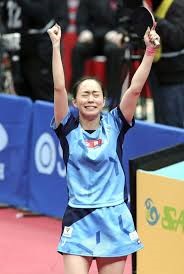"Wabi-sabi" is one of those famously untranslatable words from Japanese which conjures something somehow both intangibly vague and extremely specific. The Collins Dictionary defines "wabi-sabi" as "a way of living that focuses on finding beauty within the imperfections of life and accepting peacefully the natural cycle of growth and decay." According to Japanology.com, it reflects the Buddhist wisdom that "Both life and art are beautiful not because they are perfect and eternal, but because they are imperfect and fleeting." For athletes, this could translate to an acceptance of their declining skills as younger, faster players inevitably gain on them and take their place, just as young saplings grow from the rotting corpse of a nurse log. In this weekend's All Japan Championships, for example, top-ranked stars Tomokazu Harimoto (17) and Mima Ito (20) looked to take their place atop the heap of aging adversaries. The women's singles final of today's national championship featured Olympic teammates Kasumi Ishikawa (pictured) and Mima Ito. The lefty looper Ishikawa, 27, won her first of five national championships in 2011 at age 17. After a dominant stretch, Ishikawa was pushed aside by her younger teammate Mima Ito, another former teen phenom now all of 20 years old. Ishikawa had not won a national title for four years. For a professional winner, that is an eternity. The 20-year-old Ito, Japan's top-ranked player at #3 in the world, is perhaps the only player feared by the Chinese. Ito frustrates opponents with short pips on her backhand, her high-speed, low-spin returns setting up lethal forehand flat hits. Ito also made the most of the unexpected off-season forced by COVID-19, adding new deceptive motion to her already befuddling shovel serve. Armed with such overpowering weapons, Ito forged a 3-1 lead in the best-of-seven match. At deuce in the fifth game, she was just two points from the national championship. The veteran Ishikawa, however, was two points from getting back into the match, which she proceeded to do, 12-10. Before the stunned Ito knew what hit her, Ishikawa had seized the momentum and, with it, the match. "I resolved to fight hard until the end," she said. "It's been a while and I'm happy to be the champion again." Meanwhile, over in the men's championship, Mizuki Oikawa staged quite a comeback of his own. Trailing Masataka Morizono in the final, one game to three, Oikawa pulled an Ishikawa and rallied to win three straight. En route to the finals, the 23-year-old Oikawa beat Japan's #1 player Tomokazu Harimoto, 17, in the quarters. While it is laughable to portray players in their mid-twenties as old, this is increasingly the reality in table tennis, where the speed and power of youth tend to get the best of old age and treachery. Some recalcitrant old-timers, however, reject that storyline, preferring to author their own where they are the heroes fighting to stay in the sun as long as possible. For Kasumi Ishikawa and Mizuki Oikawa, it's still winning time. Wabi-sabi can wait. .
More at Kyodo News
